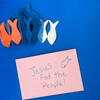“I believe that appreciation is a holy thing — that when we look for what’s best in a person we happen to be with at the moment, we’re doing what God does all the time. So in loving and appreciating our neighbor, we’re participating in something sacred.”
–Fred Rogers
Several years ago, while at the airport, my wife was looking at a menu. A complete stranger walked up to her, handed her $100 and said, “Here, get whatever you want! Enjoy! I’m going to Vegas!”
That random act of kindness was shocking. After handing her the bill he just walked off with a smile on his face. He left behind a huge smile on my surprised wife’s face.
It has been said, “It is more blessed to give than to receive” (Acts 20:35). That is true, but when you don’t have much, sometimes an unexpected $100 dollars is really appreciated.
What if we all lived our lives like that stranger? If we looked for opportunities to bless those around us, not merely monetarily, but to appreciate the challenges people may be facing, and instead of criticizing them, participate in something sacred; to be aware, to be present and to be kind.
In today’s zeitgeist, kindness is countercultural. We live in a polarized age characterized by tribalistic-tweets of 140 characters or less. In the age of Twitter, kindness is a revolutionary act.
Rage is today’s ruling online emotion, so concluded a 2013 study of Chinese mini-blogging network Weibo — a platform that resembles Twitter and at the time of the study had twice as many users.¹ Beihang University researchers examined 70 million Weibo “tweets” over a six-month period, sorting them by anger, joy, sadness and disgust. Rage was the emotion most likely to spread across social media, with one angry post powerful and persuasive enough to negatively influence a follower of a follower of a follower. When rage has the power to spread like an infectious disease, the solution is not more reactionary rage. The anecdote for rage is kindness and appreciation.
In December 2017 Twitter demonstrated what a kindness revolution can look like. Comedian Sara Silverman has been known for her provocative brand of humor. She has many critics, haters and trolls. But in 2017 instead of mocking a troll who called her a vulgar name on Twitter, she responded with genuine curiosity and kindness.
Responding to a hateful tweet from a man named Jeremy Jamrozy, Sarah said, “I believe in you. I read your timeline and I see what you are doing, and your rage is thinly veiled pain. But you know what? I know this feeling.”
Silverman’s kindness sparked a real relationship. Her understanding of Jeremy’s pain led to a real life intervention. It turns out Jeremy was abused as a child. In addition to that emotional pain he still carried, he was living with extreme back pain. Silverman learned of these things and contributed to a GoFundMe account in his name. She made it possible for him to get help for his back. With the remaining funds, he was able to help other people in his city who needed support. He says, “I was once a giving and nice person, but too many things destroyed that, and I became bitter and hateful. … Then Sarah showed me the way. Don’t get me wrong, I still got a long way to go, but it’s a start.”²
Kindness is a good place to start. It is the empathy that offers understanding that the world is a harsh place. Kindness is a holy thing that transcends individual relationships; it also has the power to transform whole communities.
A similar response to hate happened in 2018.
In the wake of another mass shooting that left 11 people dead in a synagogue, a Muslim man by the name of Qasim Rashid took to Twitter to show his solidarity to his Jewish neighbors. He said, “My faith and my duty as a neighbor command me, if any synagogue in Virginia needs help with security, I’ll stand guard. An attack on a synagogue is an attack on all houses of worship.”
A Jewish man named Rabbi Latz saw this tweet and responded, “And if your mosques needs us to stand guard, I’m there, my brother. I’m there. Our love is stronger than their hate.”³
Love is stronger than hate. If our eyes and ears are open, we can see it all around us even in this polarized age. The anecdote for rage is kindness and appreciation. There is a holy sacredness that comes with peeling back the layers and appreciating those things that unite us all as human beings. To do that, we need to seek connection before correction. At our core, we all long to love and to be loved. We all experience pain. In loving and appreciating our neighbor, we’re participating in something sacred: human kindness.
²Read more on the interaction between Sarah Silverman and Jeremy Jamrozy: mysanantonio.com/lifestyle/article/S-A-man-who-once-trolled-Sarah-Silverman-now-12471548.php#photo-14787255
³Listen to a podcast that mentions this Twitter interaction: onbeing.org/programs/shane-claiborne-and-omar-saif-ghobash-called-and-conflicted/?fbclid=IwAR38upUvpkdhB3O9lKuU0wccgzC7A31ZfgSWualBgIWGDx_K85ok-cUL0Do









